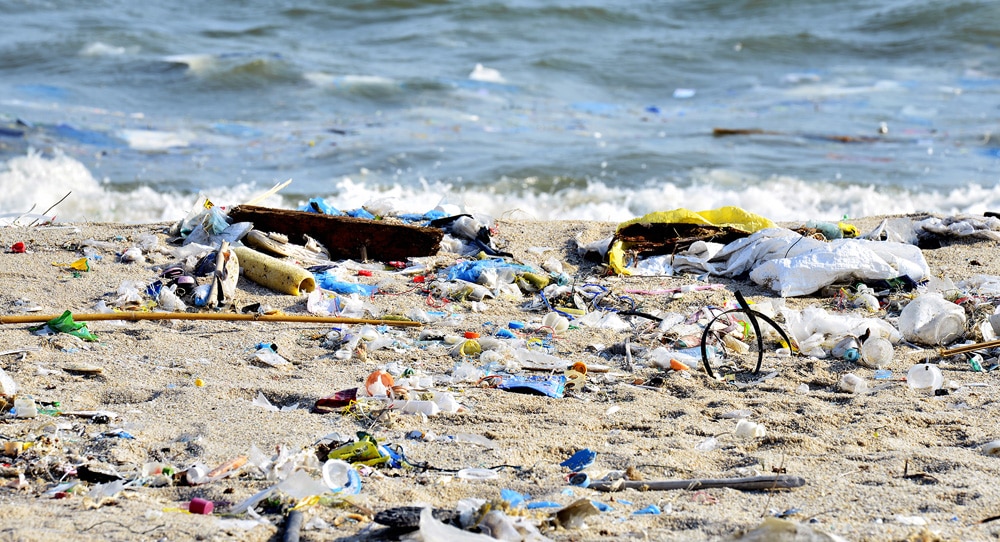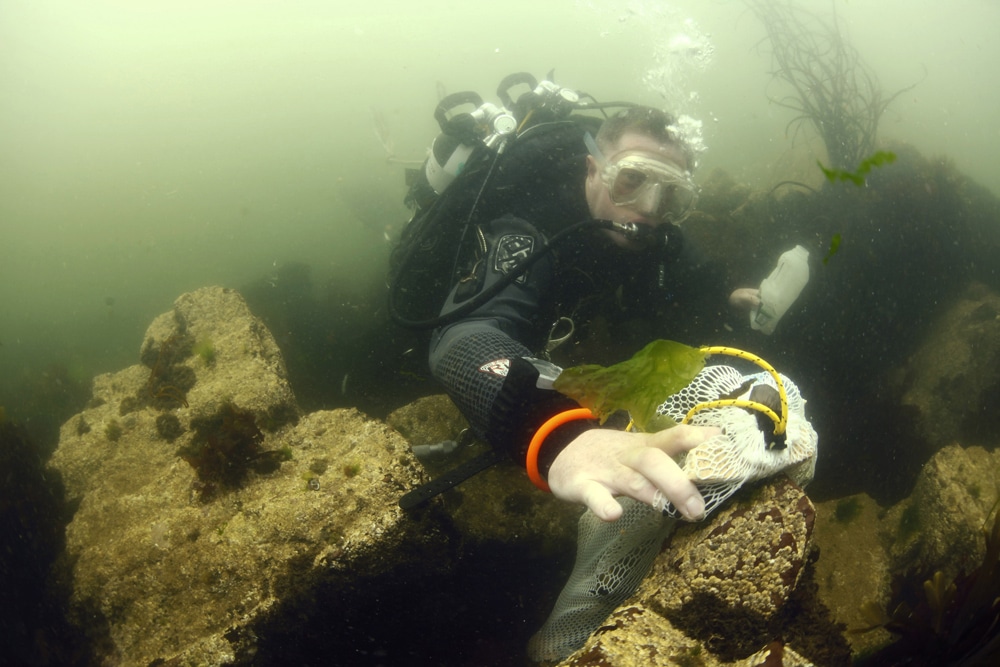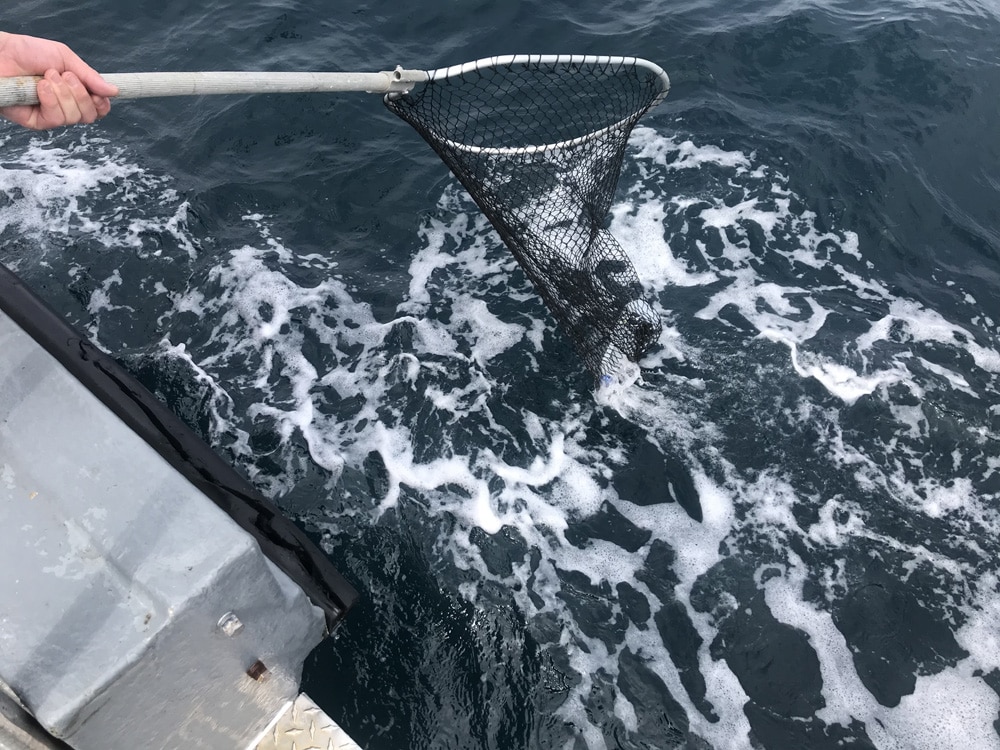Marine Life & Conservation
BSAC urges all divers to help turn the plastic tide

As a diver, it sometimes seems there’s no getting away from plastic. Many components of our kit are plastic-based and essential to the job at hand, but we are also acutely aware of the impact plastic pollution – especially single-use plastic – is having on the marine environment.
According to the Marine Conservation Society, some areas of our ocean contains six times more microplastics than plankton. This is a frightening statistic but together we can turn the tide on the amount of plastic debris reaching our seas.
A DIVER’S GUIDE TO PLASTIC
Here are just a few simple ways as a diver you can help ‘sink’ the problem of single-use plastic….
On dive trips take only essential multi-use plastic (ie, your kit!) on to your RIB, hardboat or shore dive.
When it comes to single-use plastic on dive trips, adopt the ‘DIY, swap or ditch’ approach:
- Take a packed lunch in re-usable or recyclable packaging and swap that on-the-go latte for your own reusable coffee mug or flask.
- Keep hydrated with a reusable water bottle –ask the skipper if they provide water refills and try to avoid disposable plastic water bottles wherever you can. If it’s not possible, check the bottle before you buy to ensure it can be easily recycled…. but do try to re-use it for as long as you can.
- Try to avoid carton drinks and ditch the plastic straw altogether.
Don’t forget the ‘reduce, reuse, recycle’ mantra when it comes to your kit.
Every diver’s kit suffers from wear and tear and running repairs and replacements are the norm on any dive trip. Maintaining your equipment, repairing kit and recycling what you can will ensure that you still get your dive while helping to protect the environment.
- Look after your kit to prolong its shelf life. Kit maintenance is an essential part of every diver’s routine but don’t forget to pay attention to the perishable and throwaway parts such as neck and wrist seals, mask straps, fins straps, mouth pieces etc. Rinse them properly with fresh water after each use, keep lubricated (when needed) and dry (when storing) as well as out of direct sunlight and you should get plenty of good use out of them.
- Cable ties, o-rings, broken fin straps and on-board diver plastic waste can find their way into the sea – dispose of responsibly and check the deck before you leave the dive boat for any stragglers that may have been dropped (it doesn’t take much for them to be washed overboard).
- When the time eventually comes to replace, make sure you dispose of unfixable or no longer usable items or kit parts carefully. If you are upgrading and your old kit is still perfectly usable, pass it on – donate to your club or to new members who are looking to get going with their kit.
Working together as a club, pledge to reduce your collective use of single-use plastic, both on trips and socials.
- Simple changes such as switching to reusable water bottles, collectively ditching items such as plastic straws and recycling plastic water bottles and single-use plastics at the end of every dive trip can really add up.
- Add a ‘diving with a purpose’ twist to your dive plans – organise an underwater litterpick on a favourite dive site, plan a dive to retrieve discarded fishing gear from a wreck or encourage all members to ‘marine clean’ on every dive.
- Make the most of your diving ‘down time’ to clean up! Keep a look out on your surface interval and scoop up any surface litter you may see or get the whole club, family and friends active in a topside beach clean.
- For further guidance, check out our BSAC Marine Clean online resources, which includes information on how to organise an underwater litterpick and essential advice on lifting licence requirements and risk assessments.
Away from the water, wherever possible cut down single-use plastic in your everyday.
Just a few simple tweaks and you will be surprised how you can make a positive change.
- Shop local – if you can get your new kit items from your local dive shop, you can also cut down on unnecessary packaging and waste.
- Plastic bags – just say no! Save your 5p every time you reuse one of your own bags and see how much you have at the end of the year.
- Get creative – look for alternatives to packaging, cleaning materials, toiletries etc. For some great ideas on alternatives to single-use plastics, check out the Marine Conservation Society’s easy to use Living without Plastic
- Support marine environment charities by buying their plastic free products – Surfers Against Sewage, Bite-Back and the Marine Conservation Society to name just a few have some great ideas.
Join in the BSAC Marine Clean – collect, capture and upload your Marine Clean 2018 pictures and success stories.
From a photo of the litter you collect, to a pic of your Underwater Litterpick or Beach Clean team in action, share your Marine Clean efforts on Instagram or Twitter using the hashtag #bsacmarineclean OR enter your Marine Clean photos using this form www.bsac.com/entermarineclean to show your support and be entered into the prize draw.
If you’re not a BSAC member you can still enter but please use the form so BSAC can contact you if you win.
You’ll be in with a chance of winning an Apeks Regulator worth over £500! The winner will be selected at random after the 30th September 2018. View Marine Clean 2018 entries at www.bsac.com/bsacmarinecleanpictures
Marine Life & Conservation
Paul Watson Released as Denmark Blocks Japan’s Extradition Bid

Renowned anti-whaling activist Paul Watson has been released from custody in Greenland after spending five months in detention. Denmark’s Justice Ministry rejected Japan’s request for his extradition, citing insufficient guarantees that his time already served in custody would be credited against any potential sentence.
The 74-year-old Canadian-American was arrested on July 21 in Nuuk, Greenland’s capital, when his ship docked to refuel. His arrest was based on a 2012 Japanese warrant related to a 2010 encounter in Antarctic waters. Japan alleged Watson obstructed operations and caused damage to a whaling research ship during efforts to disrupt illegal whaling. Watson has consistently denied these claims, maintaining his commitment to marine conservation.
Denmark, which oversees extradition matters for Greenland, concluded that while the legal conditions for extradition were met, the lack of assurances from Japan regarding time-served credit made extradition untenable.
In a video shared by his foundation, Watson expressed gratitude and relief, saying, “After five months, it’s good to be out… and good to know they’re not sending me to Japan.” He added that the most difficult part of his time in custody was being separated from his two young sons.
Watson is a pioneering figure in marine conservation, known for founding the Captain Paul Watson Foundation in 2022 after decades of activism with the Sea Shepherd Conservation Society. His bold efforts to defend marine life have earned him widespread support, including from celebrities and conservationists. His work has also been featured in the acclaimed reality TV series Whale Wars.
Watson’s lawyer, Jonas Christoffersen, praised the decision, stating, “We are happy and relieved that Paul Watson is now free.” He added that Watson is eager to reunite with his family and continue his vital work.
The arrest occurred while Watson’s vessel, the M/Y John Paul DeJoria, was en route to the North Pacific with a team of 26 volunteers to intercept a Japanese whaling ship. His foundation described the arrest as politically motivated and emphasized that Watson’s actions were focused on ending illegal whaling practices.
Japan resumed commercial whaling in 2019 after leaving the International Whaling Commission, asserting that whale meat is a cultural tradition. Conservationists, however, continue to challenge these practices, highlighting their impact on marine ecosystems.
Despite the challenges, Watson remains steadfast in his mission to protect marine life and bring attention to whaling practices. His dedication to ocean conservation has made him a globally respected advocate for the environment.
Marine Life & Conservation
12 Days of Zero-Waste Fish-mas

This holiday period, the Marine Conservation Society, the UK’s leading ocean membership charity, invites you to make some simple changes to eating fish this Christmas to help our seas.
Dr Kenneth Bodles, Head of Fisheries and Aquaculture at the Marine Conservation Society, said, “During the festive season, our consumption increases, but so does waste. Sustainability isn’t just about where food comes from – it’s also about how you use it. By reducing waste and making the most out of your seafood, you’re not only taking steps to be more ocean-friendly, but can also help to cut costs during what is often one of the most expensive times of the year”.
The Marine Conservation Society has compiled twelve tips on how to consume seafood sustainably with zero-waste this Christmas:
Buy whole fish instead of fillets
Instead of fillets, consider buying whole fish such as salmon, hake, or lemon sole. By adopting a “nose to tail” approach with cooking, whole-baked fish not only feeds a crowd, but also helps to minimise waste and maximise sustainability by using up every part of the animal, including bones, skin, and fat.
Make fish stock
Leftover fish bones or shells can be put to good use by boiling them to make a nourishing fish stock or bisque. This can be frozen and preserved for later use and makes for a flavourful base in a soup.
Make your own fish pâté
Avoid waste by turning leftover fish, such as smoked mackerel or salmon, into a delicious pâté by blending with cream cheese and lemon. Perfect when paired with crackers.
The sustainability of salmon and mackerel varies depending on where and how it is caught or farmed. For more information on green-rated options, check the charity’s Good Fish Guide.
Buy frozen
By purchasing seafood that is frozen or vacuum-packed, this helps to reduce waste by extending the shelf life of your food.
Fish pie
If you’re wondering what to do with leftover cooked fish, why not opt for a classic fish pie with mashed potatoes, leeks, and a cheesy sauce? A sure crowd pleaser on Boxing Day.
Use the head
Don’t forget the fish head! The meat is incredibly tender and flavourful. The charity recommends a cod’s head curry or recreating Fallow’s renowned cod’s head in siracha butter.
By stretching your ingredients further, not only is this a more sustainable way to enjoy seafood, but also cost-effective by repurposing leftovers and cooking creatively.
Boxing Day brunch
Mix leftover kippers or smoked salmon with scrambled eggs for a tasty, zero-waste, Boxing Day brunch.
For best choice, make sure you buy kippers, or herring, from the North Sea and the North Irish Sea.
Zero-waste storage
A top tip from the Marine Conservation Society to avoid waste is freezing fish offcuts to save for future use.
Crisp up the skin
Even leftover fish skin can be turned into a quick savoury snack by crisping it up in an air fryer with a little olive oil and salt.
Anchovies two ways
Leftover anchovies can either be blended with butter to make a delicious anchovy butter or tossed into pasta for a hit of umami flavour.
The charity recommends opting for anchovies caught in the Bay of Biscay for best choice.
Fishcakes
For an easy, zero-waste meal, leftover seafood trimmings can be mixed with mash and fried in breadcrumbs to make fishcakes.
Pickled mussels
Try pickling mussels in 1:1 vinegar and water, with a dash of sugar for a sustainable, zero-waste snack that can be enjoyed well beyond the festive season.
Mussels farmed in the UK are a seafood superhero. Grown using low-impact methods and harvested by hand, they get all the food they need from the sea around them. This makes them one of the most sustainable, ocean-friendly, and cost-effective seafood options.
Players of People’s Postcode Lottery have raised £6.6M towards the Marine Conservation Society’s vital work in making seafood more sustainable.
Laura Chow, Head of Charities at People’s Postcode Lottery, said: “Fish is a festive favourite for many, but making sustainable choices when it comes to how we buy and eat seafood makes all the difference for our ocean. Support from players of People’s Postcode Lottery has helped the Marine Conservation Society further its sustainable seafood work, so that we can all enjoy healthier, better protected seas.”
The Marine Conservation Society encourages you to make sustainable seafood choices a year-round habit, not just for Christmas. To check how sustainable the seafood on your plate is, you can visit the charity’s Good Fish Guide. The Guide helps consumers and businesses identify the most sustainable seafood using a simple traffic light system, based on where and how species are caught or farmed. Green is the best choice, amber means improvements are needed, and red indicates fish to avoid buying.
Zero-waste gift idea
Why not embrace a zero-waste Christmas by gifting a membership to support marine conservation? It’s a meaningful, low-waste gift that helps protect our ocean for generations to come. Memberships start from as little as £5 a month – the price of a sandwich and drink from your local coffee shop.
Find the latest sustainable seafood advice for wild-caught and farmed seafood on the Good Fish Guide, downloadable to your phone from www.mcsuk.org/goodfishguide.
-

 News2 months ago
News2 months agoIconic SS United States to become the World’s Largest Artificial Reef
-

 News3 months ago
News3 months agoBook Review – 52 Assignments: Underwater Photography
-

 Gear News3 months ago
Gear News3 months agoDYNAMICNORD – New German diving brand enters the British market
-

 News3 months ago
News3 months agoExploring Cenote El Pit: A Diver’s Dream
-

 Marine Life & Conservation3 months ago
Marine Life & Conservation3 months agoBook Review: Coral Triangle Cameos
-

 Blogs3 months ago
Blogs3 months agoDive the Egyptian Red Sea this Autumn with Regaldive
-

 News3 months ago
News3 months ago2024 Ocean Art Underwater Photo Competition Announced
-

 Gear News3 months ago
Gear News3 months agoFourth Element Launches Pelagic Dive Watch





